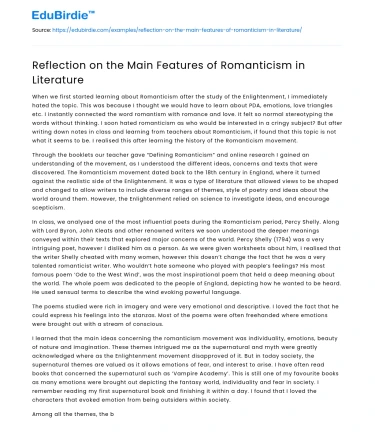When we first started learning about Romanticism after the study of the Enlightenment, I immediately hated the topic. This was because I thought we would have to learn about PDA, emotions, love triangles etc. I instantly connected the word romantism with romance and love. It felt so normal stereotyping the words without thinking. I soon hated romanticism as who would be interested in a cringy subject? But after writing down notes in class and learning from teachers about Romanticism, if found that this topic is not what it seems to be. I realised this after learning the history of the Romanticism movement.
Through the booklets our teacher gave “Defining Romanticism” and online research I gained an understanding of the movement, as I understood the different ideas, concerns and texts that were discovered. The Romanticism movement dated back to the 18th century in England, where it turned against the realistic side of the Enlightenment. It was a type of literature that allowed views to be shaped and changed to allow writers to include diverse ranges of themes, style of poetry and ideas about the world around them. However, the Enlightenment relied on science to investigate ideas, and encourage scepticism.
Save your time!
We can take care of your essay
- Proper editing and formatting
- Free revision, title page, and bibliography
- Flexible prices and money-back guarantee
In class, we analysed one of the most influential poets during the Romanticism period, Percy Shelly. Along with Lord Byron, John Kleats and other renowned writers we soon understood the deeper meanings conveyed within their texts that explored major concerns of the world. Percy Shelly (1794) was a very intriguing poet, however I disliked him as a person. As we were given worksheets about him, I realised that the writer Shelly cheated with many women, however this doesn’t change the fact that he was a very talented romanticist writer. Who wouldn’t hate someone who played with people’s feelings? His most famous poem ‘Ode to the West Wind’, was the most inspirational poem that held a deep meaning about the world. The whole poem was dedicated to the people of England, depicting how he wanted to be heard. He used sensual terms to describe the wind evoking powerful language.
The poems studied were rich in imagery and were very emotional and descriptive. I loved the fact that he could express his feelings into the stanzas. Most of the poems were often freehanded where emotions were brought out with a stream of conscious.
I learned that the main ideas concerning the romanticism movement was individuality, emotions, beauty of nature and imagination. These themes intrigued me as the supernatural and myth were greatly acknowledged where as the Enlightenment movement disapproved of it. But in today society, the supernatural themes are valued as it allows emotions of fear, and interest to arise. I have often read books that concerned the supernatural such as ‘Vampire Academy’. This is still one of my favourite books as many emotions were brought out depicting the fantasy world, individuality and fear in society. I remember reading my first supernatural book and finishing it within a day. I found that I loved the characters that evoked emotion from being outsiders within society.
Among all the themes, the beauty of nature stood out from all the others in relation to the time period. However, the romanticism movement was created to oppose the Enlightenment ideas and the industrial revolution. The Romanticism movement was formed to turn against the ideas of the increase of urbanisation, social organisations. Through studying this topic, I now understand the feelings of romanticist writers who despised this. During the romanticism period industrial revolution held a negative impact on society. This was seen in the country side, where people travelled to the city to achieve a better lifestyle and an increase of payment. This included working in factories which increased greenhouse gasses from the burning of fossil fuels.
The increase of overpopulation led to natural resources such as tress and land in nature. This led to the loss of habitat and the decrease of the population of animals. Who wouldn’t hate the idea of industrialisation? The romanticism movement revolted against the industrial revolution where writers conveyed their emotions into poems and spread throughout the country.
They despised the fact that urbanisation and the advancement of technology forced people away from the environment and created a sense of home sickness. Nature brought out the inner emotions of people allowing them to explore the depths of the wilderness of ancient cities.
We also learnt that the romanticists rebelled against the tradition was held during the period. This is seen in one of the poems ‘The tyger’, where the stanza states “What the hammer?/ What the chain?/ In what furnace was thy brain?/ What the anvil?/ What dread grasp?/ Dare its deadly terrors clasp!”. In this stanza Industrial process and human labour are referred to the tiger where imagery is used to depict the tiger as a working class in an industry. The words, hammer and furnace refer to the human items that are used within an industry. The writer uses irony, about the fact that the tiger is supposed to have its own freedom, yet it seems to be trapped.
Through studying the ‘Voices through the centuries’ I realised that the romanticism movement Is a very important above all movements as major concerns were delivered into texts depicting styles of poems, diverse themes and major poems and writers.






 Stuck on your essay?
Stuck on your essay?

